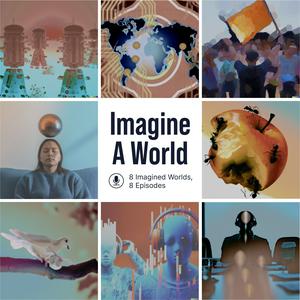What if AI allowed us to communicate with animals? Could interspecies communication lead to new levels of empathy? How might communicating with animals lead humans to reimagine our place in the natural world?Imagine a World is a podcast exploring a range of plausible and positive futures with advanced AI, produced by the Future of Life Institute. We interview the creators of 8 diverse and thought provoking imagined futures that we received as part of the worldbuilding contest FLI ran last year.In the sixth episode of Imagine A World we explore the fictional worldbuild titled 'AI for the People', a third place winner of the worldbuilding contest.Our host Guillaume Reisen welcomes Chi Rainer Bornfree, part of this three-person worldbuilding team alongside her husband Micah White, and their collaborator, J.R. Harris. Chi has a PhD in Rhetoric from UC Berkeley and has taught at Bard, Princeton, and NY State Correctional facilities, in the meantime writing fiction, essays, letters, and more. Micah, best-known as the co-creator of the 'Occupy Wall Street' movement and the author of 'The End of Protest', now focuses primarily on the social potential of cryptocurrencies, while Harris is a freelance illustrator and comic artist.The name 'AI for the People' does a great job of capturing this team's activist perspective and their commitment to empowerment. They imagine social and political shifts that bring power back into the hands of individuals, whether that means serving as lawmakers on randomly selected committees, or gaining income by choosing to sell their personal data online. But this world isn't just about human people. Its biggest bombshell is an AI breakthrough that allows humans to communicate with other animals. What follows is an existential reconsideration of humanity's place in the universe. This team has created an intimate, complex portrait of a world shared by multiple parties: AIs, humans, other animals, and the environment itself. As these entities find their way forward together, their goals become enmeshed and their boundaries increasingly blurred.Please note: This episode explores the ideas created as part of FLI’s worldbuilding contest, and our hope is that this series sparks discussion about the kinds of futures we want. The ideas present in these imagined worlds and in our podcast are not to be taken as FLI endorsed positions.Explore this worldbuild: https://worldbuild.ai/ai-for-the-peopleThe podcast is produced by the Future of Life Institute (FLI), a non-profit dedicated to guiding transformative technologies for humanity's benefit and reducing existential risks. If you would like to learn more, or are interested in collaborating with the teams featured in our episodes, please email
[email protected] can find more about our work at www.futureoflife.org, or subscribe to our newsletter to get updates on all our projectsMedia and resources referenced in the episode:https://en.wikipedia.org/wiki/Life_3.0 https://en.wikipedia.org/wiki/1_the_Road https://ignota.org/products/pharmako-ai https://en.wikipedia.org/wiki/The_Ministry_for_the_Future https://www.scientificamerican.com/article/how-scientists-are-using-ai-to-talk-to-animals/ https://en.wikipedia.org/wiki/Occupy_Wall_Street https://en.wikipedia.org/wiki/Sortition https://en.wikipedia.org/wiki/Iroquois https://en.wikipedia.org/wiki/The_Ship_Who_Sang https://en.wikipedia.org/wiki/The_Sparrow_(novel) https://en.wikipedia.org/wiki/After_Yang
